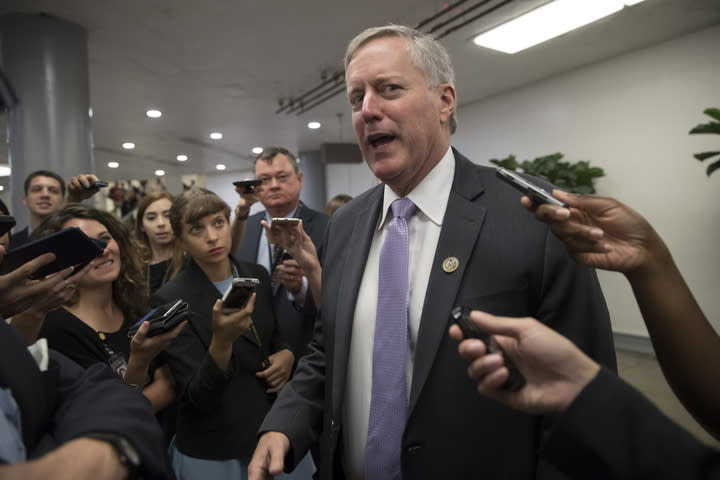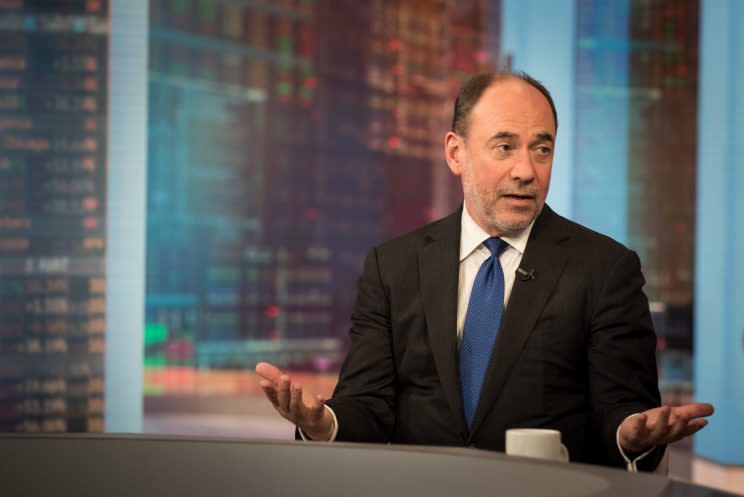Congressional Budget Office showdown: GOP tries to shoot the messenger, misses

When Congress created the Congressional Budget Office in 1974 to rein in President Nixon’s abuse of power, Steve Bell was a Republican staffer on Capitol Hill involved in the process. Bell predicted his party would try to gut the very office they set up to keep power-hungry presidents in check.
“That’s one of those times when I wished I was wrong,” Bell, now a senior adviser at the Bipartisan Policy Center, said this week in an interview.
The Republican-controlled House overwhelmingly on Wednesday rejected a proposal to neuter the CBO by removing its budget analysis division, by a vote of 309-to-116. But attempts to undermine the CBO are another example of how partisan passions in the current political environment are overwhelming consideration for long-standing norms that undergird the separation of powers.
Rep. Mark Meadows, R-N.C., the chairman of the House Freedom Caucus, spearheaded the effort to remove the CBO’s ability to provide its own independent analysis.
But as Bell explained, the CBO was created to reinforce the independence of the legislative branch from the executive branch. As Sen. John McCain said this week in a dramatic floor speech: “We are not the president’s subordinates. We are his equal.”
The CBO’s analysis usually illuminates whether the president or congressional leadership have overpromised, and the CBO’S budget projections have long been a thorn in the side of whichever political party is in power.
Bell spent 25 years on Capitol Hill, much of it in senior staff positions on the Senate Budget Committee. In an interview last month, he expressed concern that there will be pressure during this year’s budget process to use projections from the White House budget office, rather than the CBO.
The point of using the CBO rather than the White House numbers, Bell said, is to “have information that isn’t poisoned by politics.”
The CBO was established because Nixon defied Congress by saying he would not spend billions of dollars that they had authorized on domestic items such as water projects in the West. That action was part of the constitutional crisis created by Nixon’s disregard for the law, most glaringly in the Watergate scandal. It ended with the president’s resignation less than a month after signing the law that created the CBO.
“Nixon signed it [as] a last-ditch attempt to save himself,” Bell said, saying the president was trying to curry favor with Congress by backing off on the issue.

But some conservatives now believe the CBO is politicized.
Trump’s budget director, former Rep. Mick Mulvaney, recently said the CBO’s analyses are biased because the head of the health analysis division since 2009 has been a Democrat who served in President Bill Clinton’s White House. “You’ve got to ask yourself, has the day of the CBO come and gone?” Mulvaney said. Trump’s liaison to Congress, Marc Short, chimed in with an op-ed in the Washington Post calling the CBO findings “fake news.”
Back in March, when the House health care plan was assessed by the CBO, White House press secretary Sean Spicer questioned the CBO’s accuracy, and former House Speaker Newt Gingrich said the CBO was corrupt and should be abolished.
Meadows’ plan would have required the CBO director to rely solely on outside think tanks from across the ideological spectrum rather than in-house analysts. The language of the amendment instructed the CBO to “carry out [its] duties solely by facilitating and assimilating scoring data compiled by the Heritage Foundation, the American Enterprise Institute, the Brookings Institution and the Urban Institute.”
Meadows “sees the value in having an independent body for analysis specific to the legislative branch, but believes when the existing one has a track record of failing to accurately predict legislative impacts, we need to look at other options,” said Alyssa Farah, a spokeswoman for the House Freedom Caucus.
Republicans have long resented the CBO’s estimates on the impact of tax proposals, arguing that the office’s methodology does not take into account the hypothetical increase in economic growth resulting from tax cuts. As a result, in May of 2015, the GOP-controlled House directed the CBO to use what is known as “dynamic scoring.”
But the CBO’s role in the current health care process has been the breaking point for Meadows and many others on the right. The debate over various iterations of a Republican bill has centered around the CBO’s estimate that repealing Obamacare would cause roughly 20 million people to lose their coverage.
Conservative health care experts like Avik Roy have written extensively to make their case that the CBO’s estimates on the loss of coverage are based on erroneous projections.
“The CBO is more than just a referee — it’s a referee that makes up the rules of the game as it goes along,” Roy said in an email. “The most important reform of the CBO is transparency. Its models should be available to the public for evaluation and criticism. The CBO’s lack of disclosure — for example, on how much repeal of the individual mandate is driving its coverage scores — is highly problematic given the political power of the agency.”
Doug Holtz-Eakin, a Republican who was CBO director from 2003 to 2005, said that criticizing the CBO’s findings was appropriate, but drew a distinction between taking issue with its findings and questioning the existence of the office itself.
“There are reasons to disagree with the numbers … legitimate ones,” he said. But, he asked, “Will people have enough appreciation of the history and rise above the moment to preserve the institution or will they, in a short-sighted moment, essentially undercut their own ability to play on a level playing field with the executive?”
A top economic adviser to Sen. McCain during his 2008 presidential campaign, Holtz-Eakin joined all six other former CBO directors in sending a letter to congressional leaders voicing their “strong objection to recent attacks on the integrity and professionalism of the agency and on the agency’s role in the legislative process.”
Holtz-Eakin said it was not the CBO’s fault that the health care debate had focused around how the GOP proposal would impact coverage numbers.

“Republicans lost control of the debate over their own bill,” Holtz-Eakin said, simply because of President Trump.
“When the president of the United States said, ‘We’re going to cover everybody’ … they end up immediately in a coverage debate: ‘Are you covering everybody?’” Holtz-Eakin said. “They ended up way off track.”
Bell, meanwhile, said that the problem of bad forecasting has not been confined to the CBO over the past several years. Institutions like the International Monetary Fund, the World Bank, the Federal Reserve and others have struggled to make accurate projections about the economy. “We’re in an extremely uncertain period,” Bell said.
The CBO’s particular challenge, Bell said, is that they do not make use of behavioral science, even while projecting how U.S. consumers would respond to the 2010 Obamacare bill, as well as Republican efforts to repeal and replace it.
But this is not an argument for gutting the CBO, he said. “You could get a reasonably good [behavioral economics] division in the CBO for $2 or $3 million,” Bell said.
The chaotic political moment, however, has combined with extreme partisan polarization to produce some remarkable changes to congressional procedure of late. The Senate has eliminated the filibuster for Supreme Court nominees and rushed the health care bill to the floor without extensive deliberation or debate.
Gutting the CBO would have been a change in the same spirit, and may be an issue that surfaces again.
_____
Read more from Yahoo News:


